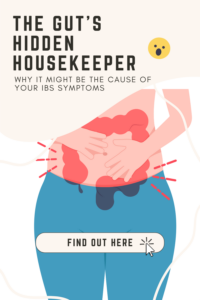Introduction
Did you know your gut has a built-in cleaning system designed to keep things running smoothly between meals? It’s called the Migrating Motor Complex (MMC), and it acts like a janitor for your digestive system, sweeping away leftover food and bacteria from the small intestine. But what happens when this natural cleaning process breaks down for whatever reason? A poorly functioning MMC can lead to conditions like Small Intestinal Bacterial Overgrowth (SIBO) and even more widespread issues like Irritable Bowel Syndrome (IBS), gastroparesis, and nutrient malabsorption. The result? Persistent bloating, discomfort, and other gut-related woes.
In this article, we’ll explore the fascinating role of the MMC, its connection to SIBO, and how you can support this crucial process to improve your overall gut health. Whether you’re battling digestive symptoms or simply want to optimize your wellness, this guide has you covered. Let’s get started!
What is the Migrating Motor Complex (MMC)?
The Migrating Motor Complex (MMC) is your gut’s natural cleaning system—a series of wave-like contractions that occur in your gastrointestinal tract when you’re not actively digesting food. I like to remember it as a janitor cleaning up after hours in a school to sweep out leftover debris, undigested food particles, and excess bacteria. Without it, bacteria and leftover waste can stay behind in your gut and that can cause problems.

So how does the MMC do this?
The four alternating MMC phases start about 90 minutes after you stop eating (2). (Easy to remember: the janitor in the high school can’t clean when kids run in the hallway. They have to wait until the kids are in class).
- Phase 1: Resting phase: A quiet 45-minute rest phase with few contractions.
- Phase 2: Intermittent Contractions: This phase lasts around 30-45 minutes in which mild contractions are starting, preparing the gut for stronger waves and the remaining debris starts to be moved.
- Phase 3: Strong Contractions (aka: the cleaning phase): The strong cleaning phase lasts only around 5-15 minutes with which contractions happen every few seconds.
- Phase 4: Transition phase: The shortest phase, lasting 5 minutes to bring the cycle back to phase 1.
Wait, but isn’t this the same as peristalsis?
Actually, no: the MMC cycle only keeps working as long as NO food is consumed, similar to the janitor who stops sweeping the second the kids open the doors to the hallway. MMC was already found in 1969 by studying fasting dogs (4). If you eat, the MMC stops cleaning and peristalsis takes over. In short: peristalsis deals with digestion (pushing food along) and MMC deals with cleaning (moving waste).
Peristalsis is a series of involuntary muscle contractions that move food through the digestive tract during digestion.
- When it Happens: It occurs while you’re eating and digesting food.
- Primary Function: Peristalsis is responsible for pushing food, liquid, and digestive juices through the esophagus, stomach, and intestines.
But what is gut motility then?
I have read all of these words used interchangeably, so let me clear it up:
Gut motility is not the same as peristalsis or MMC, but peristalsis and MMC are two major components of gut motility.
- Gut Motility: The general term for all movements in the GI tract.
- Peristalsis: The movement of food and waste during digestion.
- MMC: The “cleaning wave” during fasting
To stay in the high school janitor analogy: Peristalsis is like teachers guiding students (food) through the hallways (digestive tract) during the day, ensuring order and movement. The MMC is the janitor who comes in after hours (during fasting) to clean up leftover trash (undigested food and bacteria). Together, they form gut motility—the school’s operational system. If either the teachers stop guiding or the janitor skips cleaning, chaos ensues, leading to issues.

What is Small Intestinal Bacterial Overgrowth (SIBO)?
SIBO, as the name suggests, occurs when there are too many bacteria in the small intestine. Usually, the small intestine has few bacteria, since the bacteria are in the large intestine, where they help break down larger molecules.
The excess of bacteria can cause a myriad of problems, because the bacteria prematurely ferment food and they produce waste products, like gases.
Symptoms:
The symptoms, among others, are: Bloating, gas, abdominal pain, diarrhea, and nutrient malabsorption. Read more about nutrient malabsorption and why that matters here.

Causes:
Usually, your intestines have safeguards against too many bacteria, like: gut motility (includig peristalsis & MMC), stomach acid, and a strong immune system. If any of this is impacted, bacteria have a chance to grow and cause SIBO. Common Causes also include: poor diet, prolonged use of certain medications, and structural abnormalities in the intestines.
Left untreated, SIBO can cause long-term health complications, including weight loss/gain and malnutrition.
The Connection Between MMC and SIBO
When the MMC isn’t functioning properly, it creates the ideal conditions for SIBO to develop, so it can be a cause-and-effect relationship! Already in a study in 2002, scientists found lower MMC frequency in IBS patients with SIBO (1), highlighting the importance of gut motility in preventing this condition.
Causes of MMC Dysfunction
The Migrating Motor Complex (MMC) is a finely tuned system regulated by hormones, nerves, and your body’s internal clock. When something disrupts this balance, MMC can break down, leaving the small intestine vulnerable to bacterial overgrowth, poor digestion, and inflammation. There are unfortunately quite a few things that could cause MMC dysfunction, below I’ve given an overview:
Dietary Factors:
-
-
- Because the MMC pauses any time you eat to allow for digestion to happen, constant snacking prevents the MMC from completing. Similarly, very large meals can overwhelm the digestive system, so it delays the transition into MMC.
- Fiber supports gut motility, so if your diet lacks it, this can slow down MMC.
- Irregular eating patterns: skipping meals inconsistently or eating too close to bedtime can disrupt the natural rhythm of the MMC.
-
Stress:
-
-
-
- Chronic Stress: Stress triggers the fight-or-flight response, which prioritizes survival functions over digestion, disrupting MMC activity.
- Anxiety and Depression: These conditions can affect the gut-brain axis, reducing gut motility and MMC function.
- Poor Sleep Quality: Inadequate or irregular sleep can disrupt hormonal cycles, impacting motility
-
-

Health conditions:
-
- Any health conditions that can physically obstruct or alter pathways in the bowels can slow down motility. Think of scar tissue (adhesions) after abdominal surgeries for example, or strictures / other obstructions.
- Neurological Conditions: Diseases like Parkinson’s disease, multiple sclerosis (MS), or diabetic neuropathy can affect nerve signaling in the gut (5).
- Post-Infectious IBS: Gut infections (e.g., food poisoning, gastroenteritis) can damage the cells and nerves responsible for MMC regulation (6).
- Chronic Gut Inflammation: Conditions like Crohn’s disease or ulcerative colitis can impair MMC function.
Medications or hormonal imbalances:
-
-
- Motilin Deficiency: The hormone motilin triggers Phase 3 of the MMC. Low motilin levels can reduce the intensity and frequency of these cleaning waves.
- Ghrelin Dysregulation: Known as the hunger hormone, ghrelin also helps trigger MMC activity (7). Imbalances can disrupt the MMC’s timing.
- Thyroid Dysfunction: Hypothyroidism (underactive thyroid) can slow down overall gut motility, including MMC activity.
- Proton Pump Inhibitors (PPIs): Used for acid reflux, these can alter gut pH and disrupt MMC function.
- Opioids: Pain medications like codeine and morphine slow down gut motility.
- Antibiotics: Overuse of antibiotics can disrupt gut flora and indirectly affect the MMC.
-
Supporting a healthy MMC to Prevent SIBO
The MMC is one of your gut’s most effective defenses against SIBO. So what can you do to support it if you suspect this might be your root cause for SIBO?
Intermittent Fasting: Giving the MMC Time to Work
One of the most effective ways to support MMC function and prevent SIBO is through intermittent fasting (IF). As I explained before, the MMC is only active during fasting periods, starting about 90–120 minutes after your last meal. Every time you eat—even a small snack—the MMC stops, and the digestive system shifts its focus back to breaking down food.

How Intermittent Fasting Helps Prevent SIBO:
- Allows Full MMC Cycles: Fasting ensures that the MMC has enough uninterrupted time to clear bacteria and debris from the small intestine.
- Reduces Bacterial Overgrowth Risk: With effective MMC cycles, bacteria are less likely to linger and multiply in the small intestine.
- Supports Hormonal Regulation: Hormones like motilin and ghrelin, essential for MMC activation, are better regulated during fasting periods.
Practical Fasting Strategies for SIBO Prevention:
- Meal Spacing: Leave at least 3–4 hours between meals to allow the MMC to complete its cycle. Yes, this is a big change if you’re used to eating whenever you want. When I started, I went back to breakfast, lunch and dinner and tried to avoid eating outside of that.
- Overnight Fasting: Aim for a 12–16 hour fasting window overnight (e.g., 7 PM to 7 AM). This can be done ‘quite easily’. I usually try to work back from when I expect to get up the next day. Since I usually eat breakfast within 30 minutes after waking up, I just count back 12 hours from that moment and stop eating in the evening. (Usually, for me that’s between 8/9 pm).
- Avoid Snacking: Even small snacks interrupt MMC cycles, allowing bacteria to settle and grow. To avoid having no more ‘fun foods’ during my day, I usually try to eat a dessert or snack directly after a meal. This way, if I feel like eating dessert, I can still do so, I just try to not do it in my fasting periods.
Dietary Habits That Support MMC and SIBO
What else can you do to support your MMC, outside of skipping snacks, while battling SIBO?
- Natural Prokinetic Foods: Include natural motility-supporting foods like ginger, artichoke, peppermint, and turmeric. Prokinetics help support your MMC in a variety of ways. I take ginger and artichoke in supplement form. Artichoke helps with bile production, which in turn stimulates the MMC (8), whereas ginger helps to stimulate motility itself. The first time I took them, I heard my bowels make sounds for the first time in 10+ years!!! Don’t worry if artichoke may give you symptoms, since it’s a high FODMAP food, supplements usually use the active ingredients, which are low FODMAP and shouldn’t give you symptoms.
- There is also prokinetic medication that doctors may prescribe for you, such as: Erythromycin (an antibiotic) or Prucalopride.
- Low-FODMAP Diet: For individuals with SIBO, reducing fermentable carbohydrates may help manage symptoms. This is not a diet that will fix SIBO though, for that other strategies are needed.
- Stay Hydrated: Proper hydration supports healthy gut motility and MMC activity.

Conclusion
The Migrating Motor Complex (MMC) is a critical player in maintaining gut health, gut motility and preventing Small Intestinal Bacterial Overgrowth (SIBO). When this natural cleaning system is impaired, bacterial overgrowth can wreak havoc on your digestive system.
By understanding the connection between MMC and SIBO, making dietary adjustments, managing stress, and adopting an MMC-friendly lifestyle, you can significantly improve your gut health.
If you’re struggling with persistent digestive symptoms, don’t hesitate to consult a doctor!

